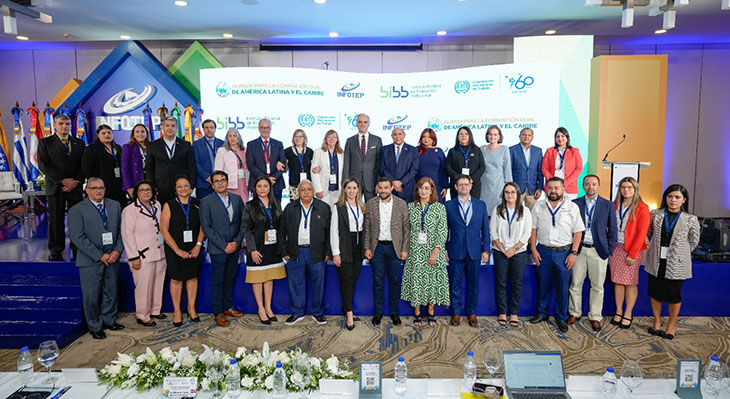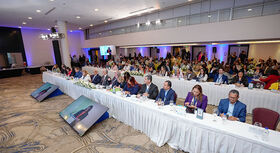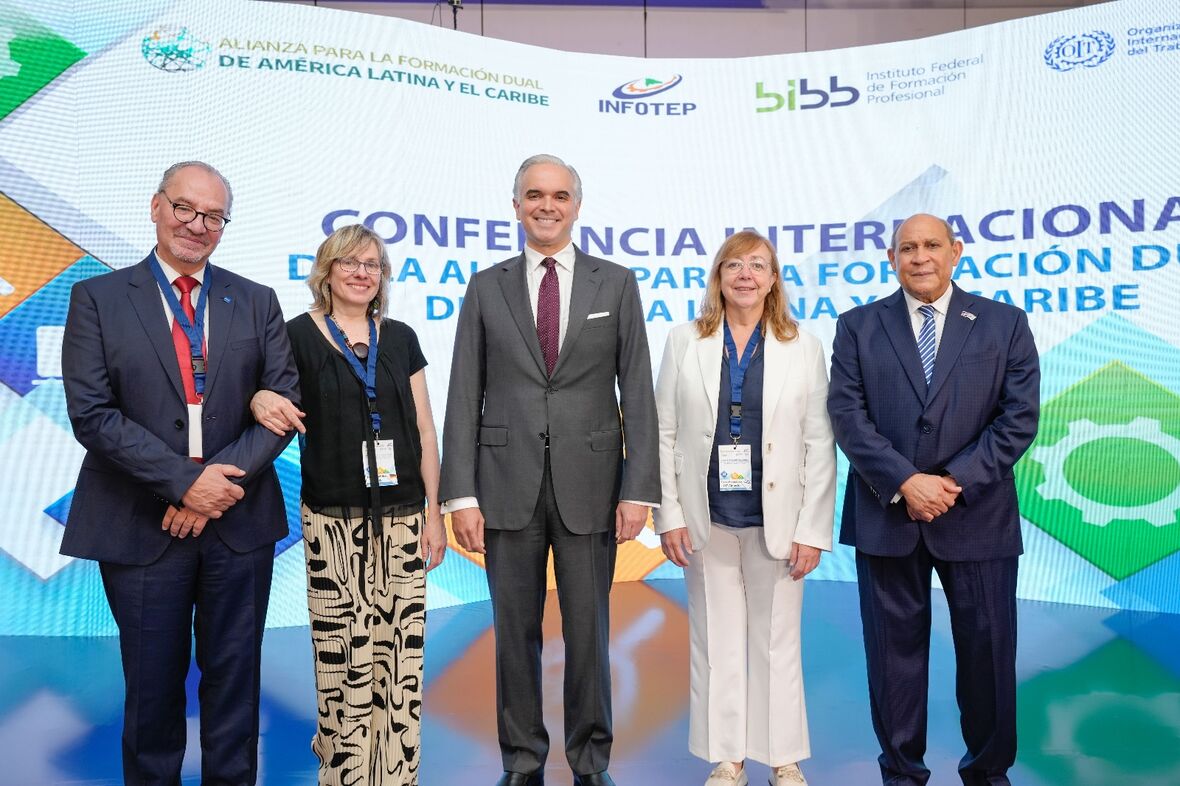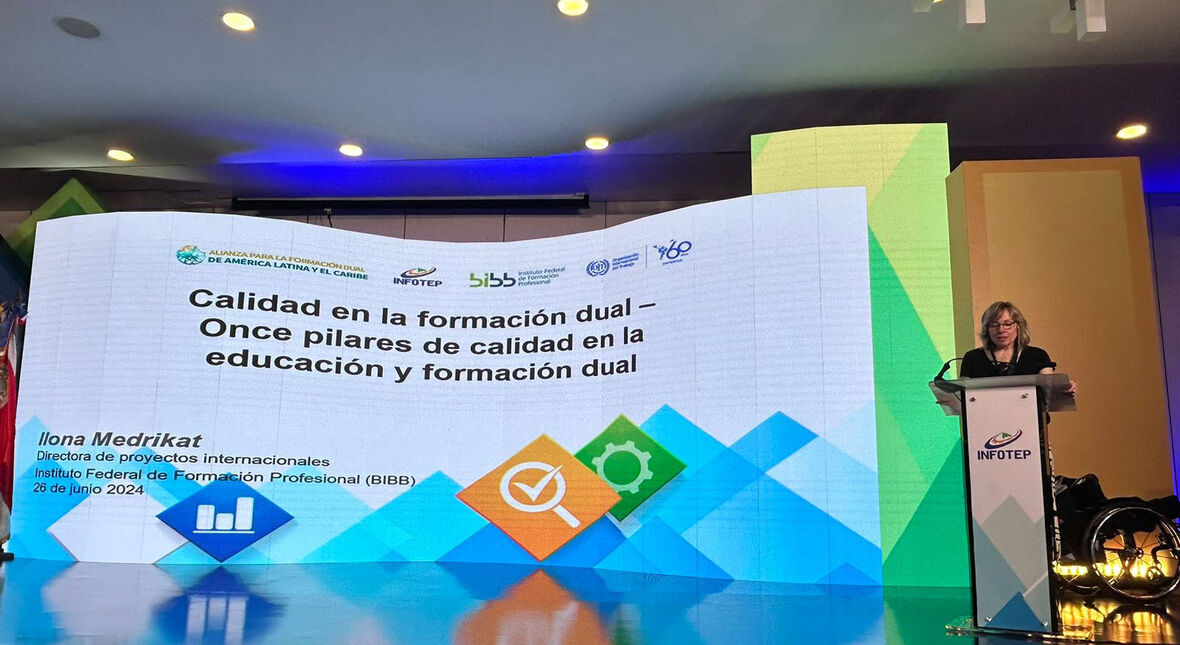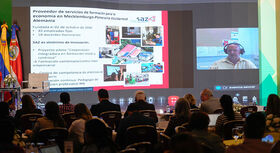New presidency of the Alianza para la formación dual de América Latina y el Caribe sets impulses for high-quality training
24.09.2024
At the invitation of the presidency of the Alianza para la formación dual de América Latina y el Caribe, INFOTEP, BIBB and ILO/Cinterfor, the members of the Alianza and representatives from politics, business and practice discussed the pillars of dual VET at an international conference in Santo Domingo.
at the conference in Santo Domingo
The international conference of the Alianza para la formación dual de América Latina y el Caribe (Alliance for dual VET in Latin America and the Caribbean) was held in Santo Domingo from 26 to 28 June 2024. The conference was organised by Instituto Nacional de Formación Técnico Profesional (INFOTEP, National Institute for Technical Vocational Education and Training) of the Dominican Republic, with support from the German Federal Institute for Vocational Education and Training (BIBB) and the Inter-American Centre for Knowledge Development in Vocational Training of the International Labour Organization (ILO/Cinterfor).
During the conference, entitled “Innovative perspectives – new approaches for ensuring a high-quality future for dual vocational education and training”, 30 representatives from 12 member institutions in 10 countries across Latin America and the Caribbean came together to share their views and ideas. More than 120 representatives from Dominican VET institutions, politics and the business sector attended the event, with more than 200 virtual attendees, following the conference in Spanish via livestream on Youtube.
Over the first two days, the conference addressed key themes such as the development of company-based and school-based standards for VET in the dual system and new forms of teaching and learning methods for teachers and trainers. The conference also covered topics such as: models facilitating company participation in VET in the dual system and the ILO Recommendation 208 on quality apprenticeships.
Partnership-based cooperation strengthens dual VET in Latin America
In his opening speech, Dominican Minister of Labour Luis Miguel De Camps, emphasised that dual VET is now more important than ever, especially for countries like the Dominican Republic, whose key raw materials, according to De Camps, are its people.
In his welcome address, Rafael Santos Badía, Director General of INFOTEP and president of the Alianza, pointed out that the forum was a sign of the commitment of the countries in the region to consolidating and expanding dual VET. In February 2024, INFOTEP assumed the one-year presidency from its predecessor, the Mexican BIBB partner institute Colegio Nacional de Formación Técnica Profesional (CONALEP).
Elena Montobbio, also Director of ILO/Cinterfor since the beginning of the year, made it clear in her presentation that the commitment to high-quality dual VET was the result of a tripartite agreement and social dialogue.
In his keynote, Michael Wiechert, head of the BIBB division "International Advisory Services/ Cooperation with Partner Institutions", highlighted the fact that economic and social transformation was currently of vital importance for all countries equally, and that VET was one of the key factors in determining the success of this transformation. He said the conference was focusing on the right issues as without qualified skilled workers the transformation goals could not be achieved.
Given the challenges posed by an accelerated transformation with significant demand from a range of different sectors for skilled workers, it is essential that we make our vocational education and training system flexible and inclusive, and that we make it outstanding, so that we provide what people need in terms of their current learning requirements.
M. Wiechert, BIBB
Wiechert emphasised the importance of working together collaboratively and on a partnership basis within the Alianza. He pointed out that he believed that the strategic approaches, which are currently being developed in VET in Germany for addressing the challenges of excellence, transformation, digitalisation and sustainability, might also provide interesting "food for thought" for Latin America and the Caribbean region.
Cross-cutting issue of quality
Quality in VET was a common thread through all themes discussed at the conference. On the first day, Gonzalo Graña, an ILO/Cinterfor technical advisor, explained the cornerstones of ILO Recommendation 208 of 2023 and the opportunities for countries to implement it.
Following on from this, Ilona Medrikat, senior technical advisor and responsible for the cooperation with the Alliance at BIBB, used the German dual system to outline the eleven key principles for high-quality training in companies and schools.
Frauke Pfaff, CEO of the Dominican-German Chamber of Industry and Commerce (AHK), reflected on the role and importance of trainers in companies from the perspective of the German dual training system at a panel on vocational training staff, where she was accompanied by Kelly Lima Teixeira from the Serviço Nacional de Aprendizagem Comercial (SENAC, National Commercial Apprenticeship Service) in Brazil, Maura Corporán, INFOTEP, and Andrés Robalino from the Corporación Formados in Ecuador.
Pfaff took a more in-depth look at examples of implementation from Mexico and Guatemala. She explained that these worked in cooperation with German schools abroad or state and private-sector training providers, the AHK and national and international companies, and were adapted to the respective system and its requirements. (See also the Youtube video, day 1, part 2)
The second day of the conference, which was also the United Nations' international SME´s Day, primarily focused on the involvement of small and medium-sized enterprises (SMEs) in dual VET. From Germany, Detlef Paleit, Head of Initial and Ccontinuing VET at the Schweriner Aus- und Weiterbildungszentrum e.V. (SAZ, Schwerin-based SAZ training centre) gave a vivid account of the tasks and opportunities of a training service provider working with and promoting collaborative forms of education and training between enterprises.
Of key interest here was the role of the intermediary between learning venues. This involves, for example, helping with training implementation, delivering training content or even exam preparation. External training management mechanisms such as these may also be interesting models for SMEs in Latin America in particular.
Representatives from four companies of different sizes, which have successfully implemented the dual training programme in cooperation with INFOTEP in the Dominican Republic, successfully rounded off this part of the programme with their experiences.
The final day of the event was reserved exclusively for the members of the Alianza: in a workshop, the cornerstones of the cooperation under the presidency of INFOTEP were discussed for 2024 and beyond. For the second semester, the Alianza's work will focus primarily on developing standards and training trainers via various online exchange formats.
The Alianza para la formación dual de América Latina y el Caribe
The Alianza para la formación dual de América Latina y el Caribe (Alliance for dual VET in Latin America and the Caribbean) was formed in 2021 with the aim of creating a network of VET institutions in the region. The objective is to promote the quality of dual education and training in the region through the exchange of experience and peer learning.
The presidency is held on a temporary basis and changes every year. Since February 2024, it has been held by INFOTEP, the Dominican National Institute for Technical Vocational Education and Training. Since its foundation, the Federal Institute for Vocational Education and Training (BIBB) has supported the Alianza as a reference institution in the coordination group together with the presidency and ILO/Cinterfor, which provides the technical secretariat.
ILO Recommendation 208
Recommendation 208 – R208 of the ILO (International Labour Organization) on quality apprenticeships was adopted at the 111th International Labour Conference in 2023, following a long discussion process. It is important for strengthening the basic principles underpinning the quality of learning for work in a changing world. The R208 may also help the countries to develop strategies related to this area and, together with the dual quality criteria from the German-speaking reference system, forms an important basis for the work of the Alliance.
